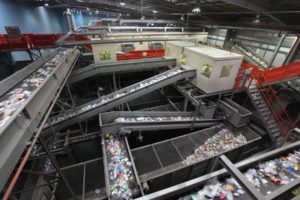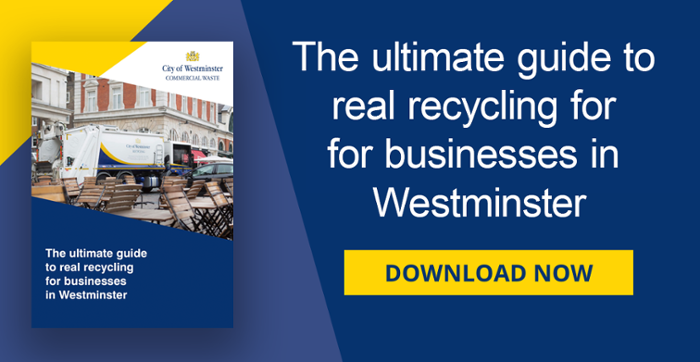In England, we average a recycling rate of around 45%. While this seems like a promising figure, other countries – such as Germany, Belgium, Austria, South Korea and Wales– are reaching rates as high as 50-60%, meaning they are leading the way in recycling and waste management. What these countries have in common is source-segregated recycling: they do not allow for the typical UK system of collecting all recyclable materials as mixed recycling (single stream recycling).
In order to increase our recycling rate, we all need to take the appropriate steps. And although your business may be combining recyclable materials as mixed recycling, segregating your waste into single material streams for recycling is the most effective way to make the most of your recycling. Source-segregated recycling does not have additional space and it also costs significantly less than mixed recycling.
What is mixed recycling?
Mixed recycling allows you to combine and recycle different materials in the same recycling bin. This includes cans, plastic bottles, tubs, pots, trays, paper, cardboard, glass and Tetra cartons. These materials are then sent for sorting and processing at a Materials Recovery Facility (MRF) before being transported to recyclers to be turned into new products.
Segregate your recycling and avoid contamination

In many cases, items or materials that are not suitable for recycling are placed in the same bin. This is known as contamination. There are a number of big culprits here: black rubbish bags, sanitary waste (tissues, toilet paper etc), laminated products, food-soiled packaging, general waste, food waste, hazardous waste, clinical waste, bulky waste, electrical items and sharp items to name a few. This means they have to be picked out by hand at the sorting facility, leading to extensive sorting, loss in efficiency and quality of the materials.
Some MRFs are notorious for the low-quality materials they sort from mixed recycling. Until recently, many MRF operators sent these low-quality contaminated materials to developing countries with lax environmental laws. This caused major pollution issues, for example, plastics accumulating in dumpsites, rivers and oceans. This situation is now addressed through restrictions on the exports of low-quality materials.
But by placing your recycling in the correct segregated bins, you can ensure the materials will be recycled much more efficiently. In fact, according to the Resources and Waste Strategy (RWS) and the Environment Bill, it will soon be a legal requirement to ensure your paper/card, plastics and glass recycling not be mixed with other waste materials. Since the launch of the RWS in 2018, the government has also released four individual consultations which will affect most businesses and shape the future of the UK’s waste management services, including those provided by local authorities.
One of these consultations includes the improvement of ‘collection consistency’, which proposes to make it mandatory for businesses to segregate all of their recycling, including dry recyclable materials, food and glass. According to the RWS, clarity over what can and cannot be recycled will help improve the quality of recycling. Having separate glass, paper and food waste collections will help ensure more packaging can be recycled in closed-loop applications, such as old cans to new cans and used paper to new paper.
Commercial Waste Services already uses some great closed-loop recycling options:
- Paper cups are recycled into new shopping bags for a prestigious West End retailer
- Paper and cardboard collected from our customers is recycled back into new cardboard packaging in Kent
- The glass we collect from hospitality businesses is recycled back into new glass bottles and jars in Yorkshire
- The food waste we collect from Westminster restaurants, food shops and hotels is used to fertilise arable land in Hertfordshire to help grow more food for Londoners
- General waste is used as fuel to produce electricity which powers our new electric collection trucks
One of the best ways to avoid the wrong items and materials ending up in your recycling (contamination) is the effective placement and labelling of your internal bins, as well as clear communication with staff, contractors, service providers and visitors. One of the biggest confusions is around material types and what waste should be segregated where, and on some occasions, items are thrown into the recycling bin with the hope that they will get recycled. This causes more harm than good. Contamination can result in entire truckloads of recycling being disposed of as general waste since they cannot be processed. Material quality is key for a well-working recycling system. Avoiding contamination, therefore, ensures that materials can be recycled in the most environmentally friendly way possible.
Check out our infographic ‘what waste goes where’ for more on segregating your waste.
Choosing a suitable recycling solution for your business
For a number of businesses, mixed recycling is not an appropriate or sustainable solution. For instance, if your business produces large amounts of one particular material, such as paper and card (shops, offices, warehouses), or glass (bars, clubs, restaurants and hotels), it is best to keep these materials separate for collection so they can be recycled without passing through a sorting facility. Source-segregated recycling can help reduce your waste management costs and it is also more efficient from a sustainability point of view.
We understand that space can be limited, especially in a crowded city such as Westminster, and that segregating your recycling into multiple separate streams might not seem like a viable option. However, a large number of businesses we work with have no issues around source-segregated recycling. These businesses recycle better and save substantial sums of money doing so.
Luckily at Commercial Waste Services, we have the right equipment and services to help you. We have a range of bins, including slimline 60-litre bins which can discreetly be placed under counters, for example, this is perfect for bars and restaurants. We also supply a range of balers to compact cardboard boxes into small cubes. Many retail businesses have discovered the convenience and efficiency of a cardboard baler.
Contact us and we’ll supply you with the appropriate equipment for your recycling needs.
What are the main recycling streams to keep separate?
To help you avoid contamination and increase the quality of recycling collected from your business, we set out the main streams to keep separate for recycling. This will help you get the most out of your recycling service whilst improving cleanliness and increasing the efficiency of managing your business’ waste.
Paper and card
- Office paper
- Envelopes
- Folders
- Cardboard boxes
- Wrapping paper
- Junk mail
- Letters
- Greeting/birthday cards
- Directories
- Newspapers and magazines
- Shredded paper
Glass
- Glass bottles of any colour (wine, beer, spirits)
- Jars (sauces, jam, baby food)
- Non-food bottles (perfume, aftershave, face creams)
Mixed recycling
- Cans and tins
- Tetra type cartons
- Plastic bottles, pots, trays and tubs
Food waste
- Meat and fish leftovers, including boxes
- Eggs and all dairy products
- Vegetables and fruit including peelings
- Bread, cake and pastries
- Coffee grounds and tea bags
- Flowers and floral decorations (not plastic or textile)
Specialist waste items
- Bulky waste and electrical equipment
- Large electrical equipment (fridges, air conditioners, washing machines etc.)
- Small electrical equipment (kettles, microwaves, lamps, TVs, coffee makers, fans etc.)
- IT equipment (phones, computers, servers, cables, photocopiers, printers etc.)
- Metal items
- Carpets, underlay rugs and flooring
- Guest room fittings ( mattresses, beds, bedside tables etc.)
- Office furniture (desks, cupboards, chairs, shelving units, sofas, cabinets, lockers etc.)
- Doors, windows and window frames
- Fixtures
- Partitions, wood, panel boards
- Large amounts of pallets and other similar items
- Confidential waste (this requires specialist handling to maintain data protection and security)
- Bank statements and financial documents
- Confidential documents such as contracts, minutes and operational plans
- Data carriers with personal information
- Private records
- Documents, folders, files, data holders (holding confidential information)
- Out of date or faulty stock, merchandise including textiles and goods
- Prototypes and samples that are commercially sensitive or confidential
- Clinical waste requires specialist handling and collection. It is produced by these businesses:
- GP practices
- Veterinary clinics
- Hospitals and health care centres
- Dental practises
- Tattoo and piercing parlours
- Beauticians and cosmetic surgeries
Want to learn more about recycling and how your business can improve the way you handle your waste? We have created a guide that will explain how to identify your waste streams (including how to segregate, store and handle them), what recycling services are available to you and the importance of ensuring your waste collector offers you a flexible solution to your business’ needs.





